
Can you still trust the (Dutch) government? – a reading list
The democratic legal order can only function optimally if there is sufficient trust between citizens and government. Citizens must be able to trust that rules and procedures are observed and that legal protection is guaranteed for everyone at all times and everywhere. This trust has been seriously damaged several times in recent years. However, government officials are largely on the brink. The white lie—which is inherent in the political arena, where politicians don't like to show the back of their tongue—has fallen into practice. Whether there is 'no active memory of something', or whether a receipt has been lost again; events are sometimes actively twisted, making it impossible for parliament to get to the bottom of things. Ultimately, citizens are the victims of this administrative culture, a fact that recently became painfully clear, partly due to the consequences of gas extraction in Groningen and the allowance affair. Even after elections Mark Rutte will remain in power with the same parties. What has been done with the calls for new leadership? As a citizen, can you still trust the government?
All books in the list below are from the collections of the Leiden University Libraries (UBL), but are only a selection of the books that the UBL owns on this subject. Click on the link under the title of the book to request it, or search our Catalogue yourself.
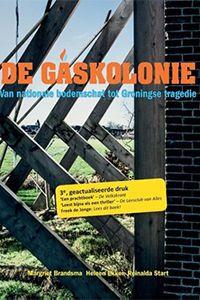
Margriet Brandsma Heleen Ekker Reinalda Start, De gaskolonie: van nationale bodemschat tot Groningse tragedie
2016
The Dutch had much to celebrate in 1959 when natural gas was found near Slochteren. For decades, the Netherlands gained a great deal of prosperity from its northernmost province, but in recent years, Groningen has been hit by earthquakes, subsidence, and damage to houses and other buildings. In De Gaskolonie, three journalists investigate the interests associated with gas extraction. What damage did the victims suffer, for example, and to what extent were safety aspects considered? Gas extraction has brought the Netherlands a lot, but who ultimately benefits from the gains and who bears the costs?
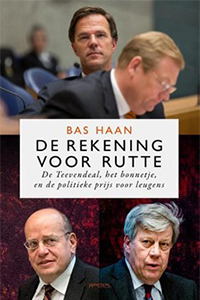
Bas Haan, De rekening voor Rutte: de Teevendeal, het bonnetje en de politieke prijs voor leugens
2017
The fact that the government does not always tell the whole truth is apparent from this reconstruction that journalist Bas Haan made of the 'receipt affair', in De rekening voor Rutte. Misleading the Tweede Kamer in this affair led to the resignation of Minister Ivo Opstelten and Staatsecretaris Fred Teeven. The latter had lied about a secret settlement with a known drug criminal. Under this regime the Ministry of Security and Justice lost most of its already feeble credibility, which eventually made the position of the new VVD minister Van der Steur untenable. They all paid the political price for their lies. But has that brought about a culture shift?
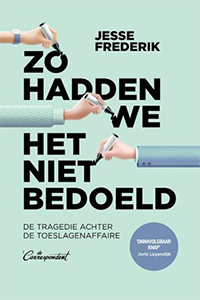
Jesse Frederik, Zo hadden we het niet bedoeld: de tragedie achter de toeslagenaffaire
2021
In the toeslagenaffaire, tens of thousands of families were labeled as fraudsters by the tax authorities, as a result of which they were wrongly forced to repay years lawfully received childcare benefits payments. Investigative journalist Jesse Frederik paints a humiliating picture of relationships on the rocks, jobs that were lost and lives that were destroyed in Zo hadden we het niet bedoeld. To this day, many parents are still waiting for compensation and, above all, answers to their questions. How did it get this far? The shocking answer: almost everyone – ministers, MPs, civil servants, journalists – did what you would expect them to do, and that is exactly why everything went wrong.
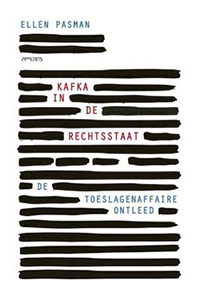
Ellen Pasman, Kafka in de rechtsstaat: de gevolgen van een leesfout: de toeslagenaffaire ontleed
2021
The coming to light of the toeslagenaffaire showed how large and fundamental the crisis in Dutch rule of law really was. For victims, going to court was often pointless and legal protection became an illusion. The Donner Committee established "institutional bias" within the tax authorities, but at the same time concluded that there was practically nothing that could be done about it. The way in which the government continued to insist on its own faultlessness is a sad low point in the recent history of Dutch justice. In Kafka in de rechtsstaat, Ellen Pasman describes how the bureaucratic apparatus came to a complete standstill, but also examines how this can be avoided in the future. But can trust still be restored?
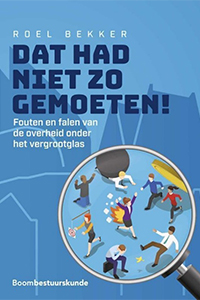
Roel Bekker, Dat had niet zo gemoeten! Fouten en falen van de overheid onder het vergrootglas
2020
Roel Bekker investigates government blunders on the basis of an analysis of major policy errors and concrete cost overruns. He also draws on his own experiences as a top civil servant when he writes about a considerable number of large and small failures, all of which can be traced back to the existing administrative culture, bureaucracy, and compartmentalization within government. Dat had niet zo gemoeten! describes a dozen of the most commonly used responses, ranging from "What do you mean, mistakes?" to humility and apologies. What are the lessons politicians are refusing to learn? And is there really any hope for improvement?
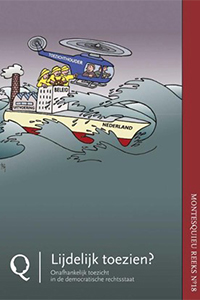
Montesquieu Instituut, Lijdelijk toezien? Onafhankelijk toezicht in de democratische rechtsstaat
2021
What is the purpose of independent public supervision and how is this organized in the Netherlands? The bundle Lijdelijk toezien? of the Montesquieu Institute discusses different types of supervisors and their corresponding powers. The theme is discussed from different angles by looking at both independent public supervision by (government) inspectorates and market regulators. Special attention is paid to the European dimension, from the national independent regulators and their parliamentary scrutiny to the relationship between regulators and their sector. But how independent is this oversight, or how independent should it be? And does public supervision still meet today's political-administrative reality?
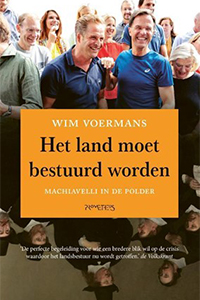
Wim Voermans, Het land moet bestuurd worden: Machiavelli in de polder
2021
In Het land moet bestuurd worden Wim Voermans is looking for explanations for the major systemic changes that have been implemented in recent decades. The labor market, the housing market, the energy market, the banking system, the pension system, the health care system, to name a few, were all overhauled. During this period, government became more influential than ever, and administrators now surpass the representatives of the people as the most important players at the Binnenhof. Moreover, drivers are increasingly escaping the grip of rules and bodies that should monitor them and that should provide counterweight and countervailing power, as happened in the toeslagaffaire. A trend that was further exacerbated by the corona crisis. How does this management culture develop further?
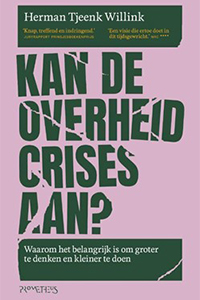
Herman Tjeenk Willink, Kan de overheid crises aan? Waarom het belangrijk is om groter te denken en kleiner te doen
2021
The way in which the current Dutch government functions has eroded the democratic legal order considerably in recent decades. With Herman Tjeenk Willink, the anxious question arises more and more often: how strong are our institutions when things really start to get tense? How 'Heroic, Determined and Merciful' are citizens when fellow citizens are declared outside the social order? What remains of the democratic constitutional state if facts and values lose out to images and sentiments? Now that decision-making has come under a magnifying glass more than ever, the weaknesses in the functioning of government are becoming sharply visible. In Kan de overheid crises aan, the former informateur is in search of answers. The conclusion: voters must start thinking differently about government and politicians have to fulfill their functions differently. Can Mark Rutte's new cabinet fulfil that promise?
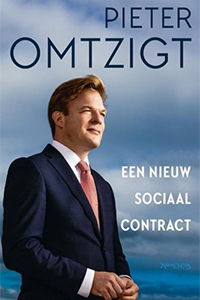
Pieter Omtzigt, Een nieuw sociaal contract
2021
Pieter Omtzigt argues that the Netherlands is experiencing major problems with power and countervailing power. According to Omtzigt, the mechanisms that must guarantee the rule of law no longer function properly, as the toeslagaffaire showed. The whole fabric of the rule of law needs to be examined and repaired. Based on his own experiences in politics, Omtzigt argues for a new social contract that should lead to renewed trust between government and citizens. This requires the systems of checks-and-balances to be renewed, but also requires a change of mentality among citizens and government. Een nieuw sociaal contract does what it says on the tin; it proposes a new social contract in an attemt to restore the idea of the rule of law.
Contact your Subject Librarian
Is a book missing on this list or would you like the UBL to acquire a book about the state of Dutch government? Contact our Subject Librarians.
